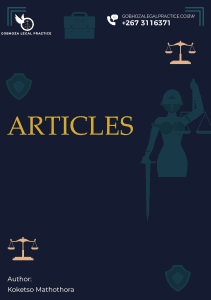- INTRODUCTION
The month of February 2022 witnessed the gazetting of many pieces of legislation relating to anti-money laundering and counter-terrorism financing. Just about three years ago, there were also many statutes and amendments which came into force on the same subject matter. The aspect of money laundering is one which has been heavily regulated across sectors. Given the number of pieces of legislation in place, there is a need for careful and calculated approach to a study of these statutes if they are to make sense to the reader.
This paper attempts to use the hub and spokes analogy to unpack these various of legislation. Simply put, it depicts the bicycle wheel where the hub is the centre which controls the whole operation, and the spokes are the links between the hub and the rim. The next section explains the Financial Intelligence Agency (FIA) as the hub. This is followed by an analysis of specified parties and accountable institutions as the spokes, and the individuals as the rim. The paper will wind up with a conclusion.
- THE HUB: FIA
The FIA is established in terms of the Financial Intelligence Act, 2022, which came into force on 25 February 2022. This Act re-enacted the Financial Intelligence Act with amendments and re-established the FIA. The core-mandate of the FIA is to deal with anti-money laundering and anti-terrorism financing. Among other things, the new Act reconstituted the National Co-ordinating Committee and made it a higher-level committee. It also expanded the list of specified persons and even went on to provide for third parties to perform certain customer due diligence measures on behalf of specified parties. The new Act also enables the FIA to initiate analysis of information where there is a suspicious transaction. To show the position of the FIA as the hub, section 6 of the Act provides that the FIA shall be the central entity. As a central authority, the FIA has many functions and responsibilities, including being responsible for exchange of information with an investigating or supervisory authority; collection, processing, analysis, and interpretation of all information obtained in terms of this Act, and guiding the specified parties.
- THE SPOKES: SPECIFIED PERSONS AND ACCOUNTABLE INSTITUTIONS
A specified party refers to a person listed in Schedule I to this Act, including branches or subsidiaries of that person. These are service providers who transact with the public. Schedule I has a list of 23 Specified parties which include attorneys, accountants, estate agents, banks, car dealers, virtual asset providers among others. These are the spokes which connect the FIA to the public who will be transacting with these specified parties. In terms of Schedule III of the Act, accountable institutions refer to any society, association or non-profit organisation registered under the Societies Act or any other law and a trustee.
The Act places duties and obligations on these specified parties. First, they have a duty to implement programmes and identify customers. To achieve this, they have obligations which include conducting risks assessments, implementation of programmes to combat commission of financial offence, implementation of group-wide programmes to counter the risk of commission of financial offence and conducting customer due diligence. The programmes to be implemented to combat the commission of financial offences include:
- designating an anti-money laundering and counter financing of terrorism officer who is at managerial level who is responsible for the implementation of internal programmes and procedures,
- establishing procedures to ensure high standards of integrity of employees,
- continuous training of employees on specified party’s obligations under the Act,
- developing and maintaining independent audit function,
- implementing and maintaining customer acceptance policy.
The duty to conducting customer due diligence is done at different levels. There is an ordinary customer due diligence which is basically identification of customers and an enhanced due diligence as a way of risk management where a risk assessment has shown that there is a high risk of commission of a financial offence. There are also enhanced due diligence measures relating to prominent influential persons; beneficiaries of life insurance services; and measures relating to cross-border correspondent banking. A specified party is required to monitor complex, unusual and high-risk transactions. A specified party is prohibited from establishing or maintaining anonymous accounts as well as from establishing or maintaining a relationship with a shell bank.
Second, a specified party is obliged to keep records obtained through customer diligence measures. Such records should be maintained for a period of twenty years. The records to be kept include:
- the identity of the customer,
- the identity of the person whose behalf the customer is acting,
- the identity of the person acting on behalf of the customer,
- the amount involved in the transaction and the parties involved,
- accounts involved in the transactions,
- any relevant documents.
Third, a specified party has reporting obligations where there are suspicious transactions. This includes reporting cash transactions above the prescribed limit. Such reports are made to FIA, as the specified parties are the spokes which feed the information to FIA.
It should be noted that these specified persons and accountable institutions are governed by their respective legislation which was enacted or amended to be in line with the new mandate. Examples of such legislation include:
- Virtual Assets Act, 2022
- Societies Act, 2022
- Real Estates Professional (Amendment) Act, 2022.
- THE RIM: THE INDIVIDUALS
The third level is that of individuals, whether natural or juristic persons, who transact with specified parties. This are usually customers. It also includes members of accounting institutions like societies and associations. Specified parties and accountable institutions are the link between these individuals and the FIA.
- CONCLUSION
This paper sought to unpack and contextualise the recently enacted laws relating to anti-money laundering and counter terrorism financing legislation. The hub and spokes approach used established that the FIA plays a central role and is the driver of all aspects on financial intelligence. However, for FIA to be effective, it relies on robust specified persons and accountable institutions. These have numerous duties and responsibilities in terms of the Financial Intelligence Act, 2022 and other laws. These specified persons and accountable institutions are the spokes, being the link between the FIA and the individuals. It is hoped that this approach would assist the reader in navigating this Act and other related legislation.
Disclaimer: This article is for information only and should not be taken as legal advice.




Leave a reply